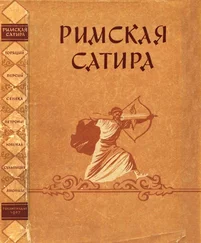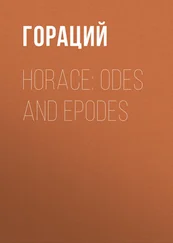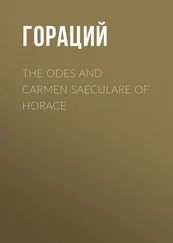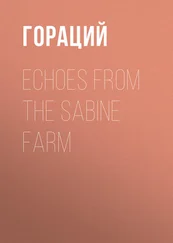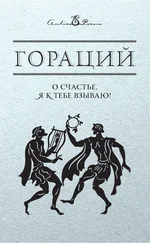Квинт Гораций Флакк - The Works of Horace
Здесь есть возможность читать онлайн «Квинт Гораций Флакк - The Works of Horace» — ознакомительный отрывок электронной книги совершенно бесплатно, а после прочтения отрывка купить полную версию. В некоторых случаях можно слушать аудио, скачать через торрент в формате fb2 и присутствует краткое содержание. Жанр: foreign_poetry, Поэзия, foreign_antique, foreign_prose, на английском языке. Описание произведения, (предисловие) а так же отзывы посетителей доступны на портале библиотеки ЛибКат.
- Название:The Works of Horace
- Автор:
- Жанр:
- Год:неизвестен
- ISBN:нет данных
- Рейтинг книги:3 / 5. Голосов: 1
-
Избранное:Добавить в избранное
- Отзывы:
-
Ваша оценка:
- 60
- 1
- 2
- 3
- 4
- 5
The Works of Horace: краткое содержание, описание и аннотация
Предлагаем к чтению аннотацию, описание, краткое содержание или предисловие (зависит от того, что написал сам автор книги «The Works of Horace»). Если вы не нашли необходимую информацию о книге — напишите в комментариях, мы постараемся отыскать её.
The Works of Horace — читать онлайн ознакомительный отрывок
Ниже представлен текст книги, разбитый по страницам. Система сохранения места последней прочитанной страницы, позволяет с удобством читать онлайн бесплатно книгу «The Works of Horace», без необходимости каждый раз заново искать на чём Вы остановились. Поставьте закладку, и сможете в любой момент перейти на страницу, на которой закончили чтение.
Интервал:
Закладка:
ODE V.
ON THE RECOVERY OF THE STANDARDS FROM PHRAATES.
We believe from his thundering that Jupiter has dominion in the heavens: Augustus shall be esteemed a present deity the Britons and terrible Parthians being added to the empire. What! has any soldier of Crassus lived, a degraded husband with a barbarian wife? And has (O [corrupted] senate, and degenerate morals!) the Marsian and Apulian, unmindful of the sacred bucklers, of the [Roman] name and gown, and of eternal Vesta, grown old in the lands of hostile fathers-in-law, Jupiter and the city being in safety? The prudent mind of Regulus had provided against this, dissenting from ignominious terms, and inferring from such a precedent destruction to the succeeding age, if the captive youth were not to perish unpitied. I have beheld, said he, the Roman standards affixed to the Carthaginian temples, and their arms taken away from our soldiers without bloodshed. I have beheld the arms of our citizens bound behind their free-born backs, and the gates [of the enemy] unshut, and the fields, which were depopulated by our battles, cultivated anew. The soldier, to be sure, ransomed by gold, will return a braver fellow!—No—you add loss to infamy; [for] neither does the wool once stained by the dye of the sea-weed ever resume its lost color; nor does genuine valor, when once it has failed, care to resume its place in those who have degenerated through cowardice. If the hind, disentangled from the thickset toils, ever fights, then indeed shall he be valorous, who has intrusted himself to faithless foes; and he shall trample upon the Carthaginians in a second war, who dastardly has felt the thongs with his arms tied behind him, and has been afraid of death. He, knowing no other way to preserve his life, has confounded peace with war. O scandal! O mighty Carthage, elevated to a higher pitch by Italy's disgraceful downfall! He (Regulus) is reported to have rejected the embrace of his virtuous wife and his little sons like one degraded; and to have sternly fixed his manly countenance on the ground, until, as an adviser, by his counsel he confirmed the wavering senators, and amid his weeping friends hastened away, a glorious exile. Notwithstanding he knew what the barbarian executioner was providing for him, yet he pushed from his opposing kindred and the populace retarding his return, in no other manner, than if (after he had quitted the tedious business of his clients, by determining their suit) he was only going to the Venafrian plains, or the Lacedaemonian Tarentum.
ODE VI.
TO THE ROMANS.
Thou shalt atone, O Roman, for the sins of your ancestors, though innocent, till you shall have repaired the temples and tottering shrines of the gods, and their statues, defiled with sooty smoke. Thou boldest sway, because thou bearest thyself subordinate to the gods; to this source refer every undertaking; to this, every event. The gods, because neglected, have inflicted many evils on calamitous Italy. Already has Monaeses, and the band of Pacorus, twice repelled our inauspicious attacks, and exults in having added the Roman spoils to their trivial collars. The Dacian and Ethiopian have almost demolished the city engaged in civil broils, the one formidable for his fleet, the other more expert for missile arrows. The times, fertile in wickedness, have in the first place polluted the marriage state, and [thence] the issue and families. From this fountain perdition being derived, has overwhelmed the nation and people. The marriageable virgin delights to be taught the Ionic dances, and even at this time is trained up in [seductive] arts, and cherishes unchaste desires from her very infancy. Soon after she courts younger debauchees when her husband is in his cups, nor has she any choice, to whom she shall privately grant her forbidden pleasures when the lights are removed, but at the word of command, openly, not without the knowledge of her husband, she will come forth, whether it be a factor that calls for her, or the captain of a Spanish ship, the extravagant purchaser of her disgrace. It was not a youth born from parents like these, that stained the sea with Carthaginian gore, and slew Pyrrhus, and mighty Antiochus, and terrific Annibal; but a manly progeny of rustic soldiers, instructed to turn the glebe with Sabine spades, and to carry clubs cut [out of the woods] at the pleasure of a rigid mother, what time the sun shifted the shadows of the mountains, and took the yokes from the wearied oxen, bringing on the pleasant hour with his retreating chariot. What does not wasting time destroy? The age of our fathers, worse than our grandsires, produced us still more flagitious, us, who are about to product am offspring more vicious [even than ourselves].
ODE VII.
TO ASTERIE.
Why, O Asterie, do you weep for Gyges, a youth of inviolable constancy, whom the kindly zephyrs will restore to you in the beginning of the Spring, enriched with a Bithynian cargo? Driven as far as Oricum by the southern winds, after [the rising] of the Goat's tempestuous constellation, he sleepless passes the cold nights in abundant weeping [for you]; but the agent of his anxious landlady slyly tempts him by a thousand methods, informing him that [his mistress], Chloe, is sighing for him, and burns with the same love that thou hast for him. He remonstrates with him how a perfidious woman urged the credulous Proetus, by false accusations, to hasten the death of the over-chaste Bellerophon. He tells how Peleus was like to have been given up to the infernal regions, while out of temperance he avoided the Magnesian Hippolyte: and the deceiver quotes histories to him, that are lessons for sinning. In vain; for, heart-whole as yet, he receives his words deafer than the Icarian rocks. But with regard to you, have a care lest your neighbor Enipeus prove too pleasing. Though no other person equally skillful to guide the steed, is conspicuous in the course, nor does any one with equal swiftness swim down the Etrurian stream, yet secure your house at the very approach of night, nor look down into the streets at the sound of the doleful pipe; and remain inflexible toward him, though he often upbraid thee with cruelty.
ODE VIII.
TO MAECENAS.
O Maecenas, learned in both languages, you wonder what I, a single man, have to do on the calends of March; what these flowers mean, and the censer replete with frankincense, and the coals laid upon the live turf. I made a vow of a joyous banquet, and a white goat to Bacchus, after having been at the point of death by a blow from a tree. This day, sacred in the revolving year, shall remove the cork fastened with pitch from that jar, which was set to inhale the smoke in the consulship of Tullus. Take, my Maecenas, a hundred cups on account of the safety of your friend, and continue the wakeful lamps even to day-light: all clamor and passion be far away. Postpone your political cares with regard to the state: the army of the Dacian Cotison is defeated; the troublesome Mede is quarreling with himself in a horrible [civil] war: the Cantabrian, our old enemy on the Spanish coast, is subject to us, though conquered by a long-disputed victory: now, too, the Scythians are preparing to quit the field with their imbent bows. Neglectful, as a private person, forbear to be too solicitous lest the community in any wise suffer, and joyfully seize the boons of the present hour, and quit serious affairs.
ODE IX.
TO LYDIA.
HORACE. As long as I was agreeable to thee, and no other youth more favored was wont to fold his arms around thy snowy neck, I lived happier than the Persian monarch.
LYDIA. As long as thou hadst not a greater flame for any other, nor was Lydia below Chloe [in thine affections], I Lydia, of distinguished fame, flourished more eminent than the Roman Ilia.
HOR. The Thracian Chloe now commands me, skillful in sweet modulations, and a mistress of the lyre; for whom I would not dread to die, if the fates would spare her, my surviving soul.
Читать дальшеИнтервал:
Закладка:
Похожие книги на «The Works of Horace»
Представляем Вашему вниманию похожие книги на «The Works of Horace» списком для выбора. Мы отобрали схожую по названию и смыслу литературу в надежде предоставить читателям больше вариантов отыскать новые, интересные, ещё непрочитанные произведения.
Обсуждение, отзывы о книге «The Works of Horace» и просто собственные мнения читателей. Оставьте ваши комментарии, напишите, что Вы думаете о произведении, его смысле или главных героях. Укажите что конкретно понравилось, а что нет, и почему Вы так считаете.

